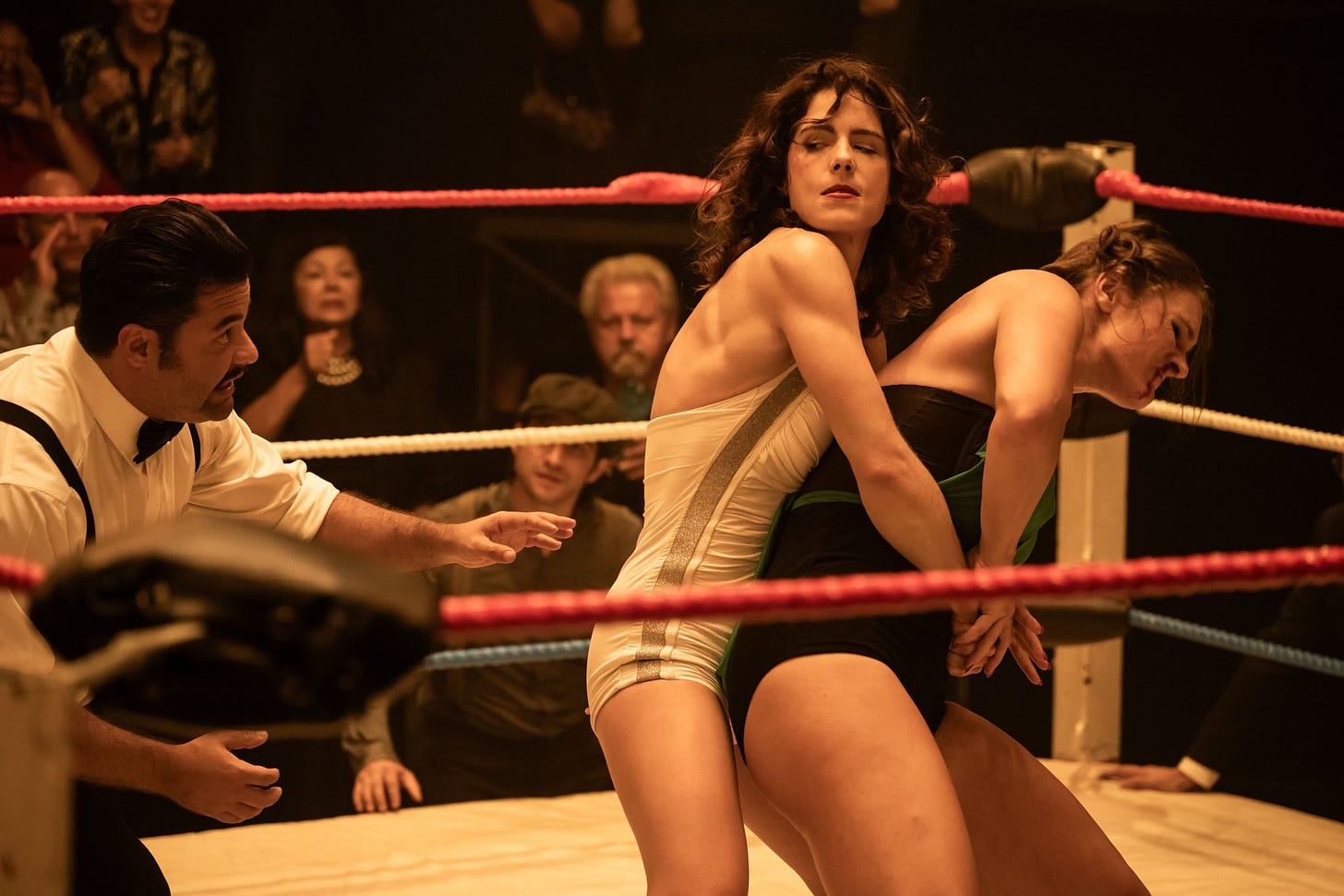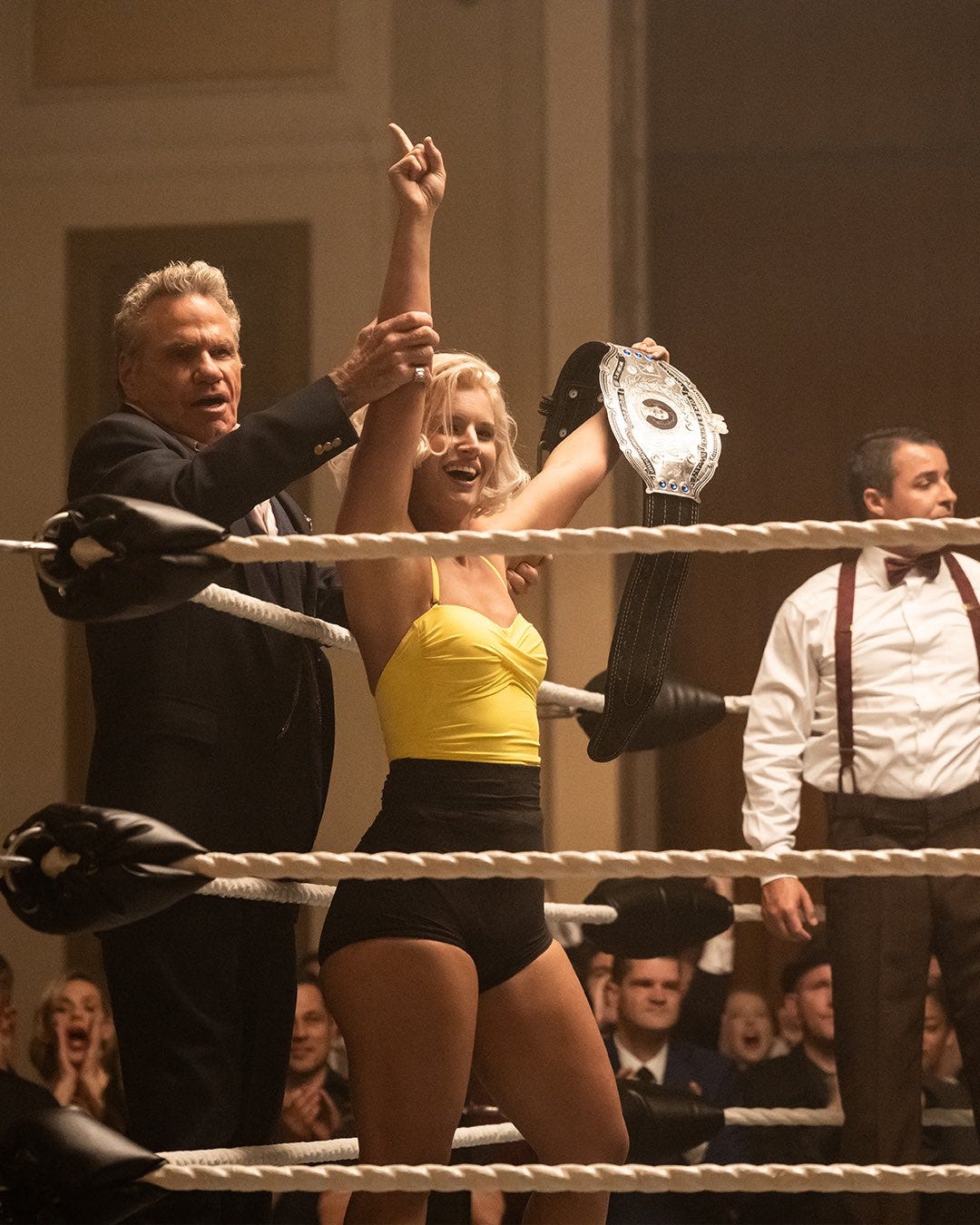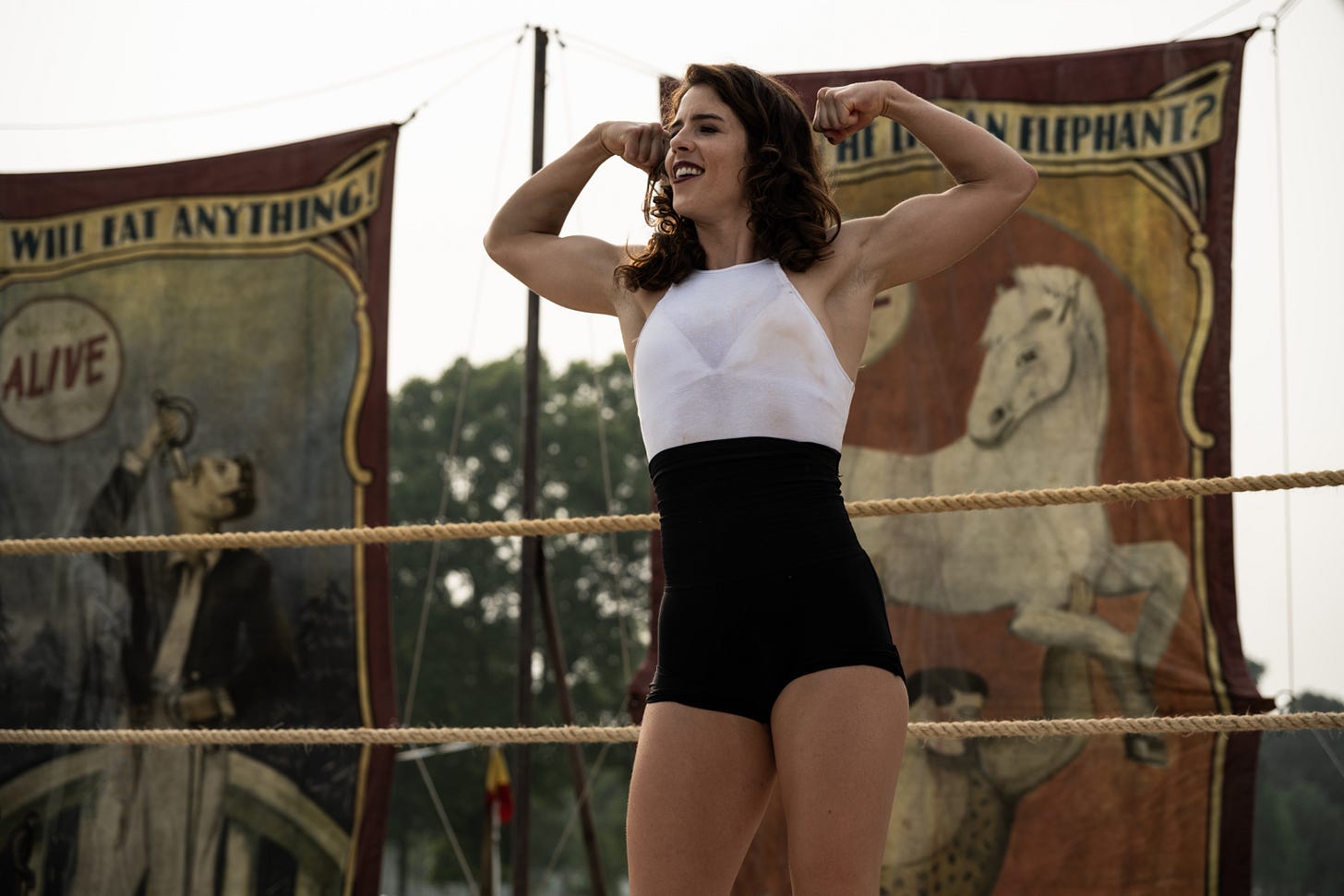I, of all people, was shocked to learn that a movie about pro wrestling, featuring stars from WWE, AEW, and TNA, came out in March with very little fanfare. The reason, ironically, may be the result of something the movie takes on – women's wrestling doesn't get the respect it deserves. A biopic of Bruno Sammartino or Lou Thesz might catch the attention of fans old and new, but Mildred Burke? Honestly, I never heard of her before this movie. There are a number of possible reasons why, and not all of them my fault, but I'm grateful for a biopic to correct the record...and also grateful that Sumerian pictures, a distributor usually associated more with music acts like Poppy and The Pretty Wild, has seen fit to rerelease Queen of the Ring in theaters and on digital this weekend for Mother's Day (because Burke was a single mom, I guess).
Woman-on-woman professional wrestling used to be banned in many states, even as late as the 1970s, because for some reason, women fighting in the equivalent of swimsuits was deemed prurient, while men doing the same in Greco-Roman fashion was totally not gay at all, but good, clean family entertainment. Arrow costar Emily Bett Rickards puts her superhero-show physique to good use as Mildred, a waitress who attends local wrestling shows and determines that she wants to do that for a living. Arrow has a long history with wrestling – Cody Rhodes guest-starred on it as early as his Stardust days, struck up a friendship with star Stephen Amell, and the two even wrestled each other at a SummerSlam. Amell would go on to star in the wrestling-based drama series Heels, which featured CM Punk and his wife AJ Lee as recurring cast members. Now it's Rickards' turn, and she rises to the occasion, though given the movie's relatively low profile, she may not end up wrestling on a pay-per-view against, say, Toni Storm, whose “timeless” gimmick makes her just right for a small role here as a women's champion of the '30s.
Today's wrestling fan is as likely to be interested in the past as the present, but rarely do we get a look as far back as the 1930s, when women, who couldn't wrestle other women, stayed true to the carney roots of the “sport” and challenged men from the audience as part of a sideshow act. One of the difficulties many scripted movies have when it comes to portraying pro-wrestling is creating sports-movie drama out of a scripted athletic display, but in these early days, the performance was as likely as not to devolve into a shoot (real fight), a tradition that continued even into the '80s when Vince McMahon Jr. had Fabulous Moolah really roll up Wendi Richter to steal the women's title from her in an undisclosed finish. While watching the climax of Queen of the Ring, I thought to myself there was no way such a high-profile match would not have been fixed and the finish vetted; it turns out the real thing was, in fact, more real than not.
Director Ash Avildsen, who cheekily casts himself in a small role as Vince McMahon Sr., is the son of Rocky and Karate Kid director John G. Avildsen, and this is the first of his movies to feel like it was formed from studying his father's foremost formula to a tee (Martin Kove even shows up, albeit not as a bad guy). The period details at first may feel a little slick and clean, but if the subject matter is of any interest to you at all, you should quickly get into the story of a female athlete who initially falls for her trainer, Billy Wolfe (Josh Lucas), then gets exasperated with his drunken cheating, then marries him solely to ensure that as her manager, he's guaranteed to split the profits 50-50. The movie sets the stage like a real-life angle – when the marriage of convenience inevitably goes south, it's a natural build to a main event with Mildred against Billy's new daughter-in-law, who also happens to be a previous foe of Mildred's that shot on her for real on the carney circuit: June Byers, played by former NWA women's champion Kamille.
There are a few in-jokes for fans, about how old-school promoters think that involving fellow promoters in storylines is a bad idea, although Vince McMahon Sr. notes that his son likes the notion, LOL. Jim Cornette cameos as an NWA board member; that, and the fact that longtime commentator and talent relations veteran Jim Ross is an executive producer should tell you this movie takes the business seriously. WWE's Naomi appears as one of the first Black female wrestlers, while Mickie James supposedly filmed scenes as Fabulous Moolah, but unless I blinked and missed them, they're not in the final cut. Mae Young, however, is a significant character, played by Francesca Eastwood, with zero pretense about the fact that she liked girls. Those who mostly know Mae from her Attitude Era appearances in her 80s, randomly giving birth to a severed human hand – yes, that happened in the script – may start to understand the hype in seeing her portrayed in her young hotness heyday.
Walton Goggins is exactly the type of actor you'd expect to show up in something like this, so of course he does, as Jack Pfefer, one of the first promoters to play up the theatricality of the presentation rather than promoting it as pure sport. Burke, as presented in the movie, is an absolute natural who understands wrestling as storytelling in a way that was never talked about openly back then, but it's Pfefer who knows how to book events that draw money, and it's a world that still requires a man to do it. Though the savvy women know how to work it, too – there's a scene in which talent and bookers go to Washington D.C. to schmooze with politicians who turn out to secretly be big fans of the product. Some things never change, as Vince McMahon in the '80s would frequently give elected officials the VIP arena show treatment to get them to deregulate him.
I was reminded of the UK stage play Trafford Tanzi, set in a wrestling ring, about a British woman who wants to be a wrestler, falls for one, and then has to fight him, with every stage of their life represented by a different round of wrestling, culminating in a “loser does the housework” match. Here it's Mildred falling for Wolfe, metaphorically grappling with their dynamic, and finally taking him on vicariously as both a rival promoter and literal opponent to his champion. Did Burke's real life truly mirror a wrestling angle that closely? Perhaps, and perhaps it's been massaged just a bit for the sake of cinematic entertainment. I doubt the real Burke or Pfefer would have it any other way.
Queen of the Ring is now playing in select theaters and available as VOD. Images courtesy of Sumerian.
Prefer not to subscribe via Substack? You can leave a tip through Buy Me a Coffee instead.






